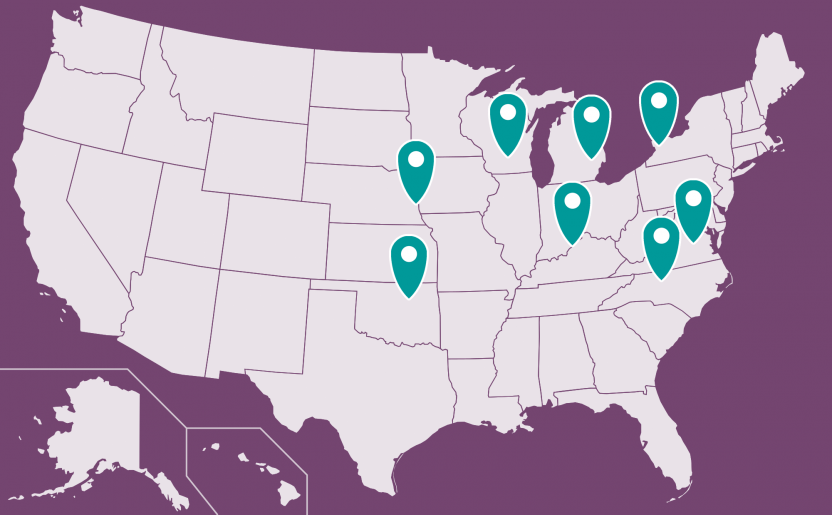ChangeLab Solutions is pleased to announce our selections for the Housing Solutions Collaborative! Congratulations to eight cross-sector teams on joining this year-long peer-learning cohort. Each team is from a small to mid-sized city facing unique conditions that impede housing equity. Conditions include segregation, aging housing stock, growing gaps between incomes and rents, and restrictive laws and policies that severely limit the actions that local governments can take to address social and racial inequities in housing.
The Housing Solutions Collaborative will provide the teams with technical assistance and a shared foundation for collective problem solving. We’re excited to embark on a year of collaborative learning to advance policy goals through information sharing, networking, and building each jurisdiction's knowledge and capacity to address the housing crisis.
Meet the Housing Solutions Collaborative community teams:
The Buffalo, New York, community team comprises the Buffalo Urban Renewal Agency, Matt Urban Center, Heart of the City Neighborhoods, and the City of Buffalo. Buffalo faces myriad housing challenges: it is one of the most racially segregated cities in the nation due to the lingering impact of redlining, and it has a weak housing market, a limited geographic footprint, a 14% housing vacancy and abandonment rate, and the oldest housing stock in the nation, with 90% of homes built before lead paint was banned in 1978. To address these challenges, the Buffalo team has been working to increase the supply of affordable housing, remove unsafe and unhealthy structures, and support new efforts to reduce lead hazards in rental and owner-occupied housing.
The community team in Chesterfield County, Virginia, consists of the Partnership for Housing Affordability, the County of Chesterfield, and Virginia Community Voice. In the last 10 years, Chesterfield County has seen rent prices increase by 27%, while incomes have increased by only 12%. The rapid increase in rent has combined with population growth to make it impossible for Chesterfield County to adequately house its workforce, which includes many people with low income. The goal of Chesterfield County’s community team is to draft and obtain adoption of an affordable dwelling unit (ADU) ordinance. The team will also design a performance grant policy to provide financial benefits to developments throughout the county, specifically in areas designated as revitalization zones.
In Louisville, Kentucky, the community team comprises the Metropolitan Housing Coalition, the Louisville Metro Government Office of Housing, the Center for Neighborhoods, and the Office of Councilmember Cassie Chambers Armstrong. Louisville’s housing challenges include affordability, availability, poor quality, severe residential segregation, and high levels of eviction and displacement. Over 46% of renter households are cost-burdened, disproportionately affecting Black residents ― a legacy of Louisville’s long history of discrimination and residential segregation. To create comprehensive solutions to these issues, the Louisville team will work to strengthen tenant protections while enhancing community outreach and education. As a buffer against Louisville’s excessively high eviction rates, the team will seek to direct affordable housing opportunities to those most in need.
The community team in Madison, Wisconsin, consists of the City of Madison, the Department of Planning and Landscape Architecture at the University of Wisconsin – Madison, and Madison Development Corporation. Madison is one of the fastest-growing mid-sized cities in the Midwest, and it is projected that future growth will worsen existing housing challenges and racial inequities. Most Black households in the city of Madison cannot afford the typical rent by a margin of approximately $200. By comparison, the median white household in Madison can afford to pay approximately $920 more in rent each month than the median Black household. To tackle these complex challenges, the Madison team will collaborate with other cities in exploring ways to incentivize the inclusion of affordable housing in new developments despite state laws that prohibit rent control and inclusionary zoning. The team will assess comprehensive solutions, including changes to the city’s zoning code, funding mechanisms, and overall affordable housing strategies.
In Oakland County, Michigan, the community team of Oakland County Neighborhood & Housing Development, Community Housing Network, and The Arc of Oakland County is working toward solutions that tackle the immense income inequities in the county and the institutional bias whereby people with disabilities are forced to live in congregated settings in low-income areas, without sufficient access to affordable, inclusive housing. The team will convene changemakers across industries ― from urban planners to academics ― to develop a countywide strategy that promotes affordable and accessible housing for people with disabilities and their families. These initiatives may include incentivizing inclusionary zoning at the local level, prohibiting source-of-income discrimination, and incentivizing landlords to maintain affordable, accessible units.
The Omaha, Nebraska, community team comprises Heartland Family Service, Holy Name Housing Corporation, and the City of Omaha Planning Department’s Community Development Division. Northern Omaha has been shaped by the legacy of redlining; it faces segregation, aging housing stock, disinvestment, and a 31% poverty rate. To combat these issues, the Omaha team will identify cutting-edge approaches to improve and renew the local Middle-Income Workforce Housing Development Fund ― a matching grant program that supports investment in older urban neighborhoods and communities whose residents are predominantly people of color. The team aims to promote a robust property management model with proactive code enforcement and high-quality housing standards that empowers the community while eliminating evictions and non-renewals.
In Orange County, North Carolina, the Orange County Housing and Community Development Department is partnering with EmPOWERment, Inc., the Town of Chapel Hill Office of Housing and Community, and the Town of Carrboro Housing and Community Services Department. Located in the Research Triangle, Orange County is more housing cost–burdened ― with higher rents and lower renter wages ― than the state as a whole. The COVID-19 pandemic has further exacerbated housing issues in the region ― particularly the need for short-term financial assistance with housing costs like rent and utilities. Between March 2020 and June 2021, the Emergency Housing Assistance (EHA) program scaled up to meet skyrocketing demand and helped over 1,300 residents remain in stable housing. By identifying and implementing complementary policy strategies, this team aims to further the EHA program as the county moves into post-pandemic recovery.
The Tulsa, Oklahoma, community team includes the Tulsa Authority for Economic Opportunity, the Tulsa Planning Office at INCOG, and TEDC. In Tulsa, 46% of all tenants are cost-burdened, resulting in high rates of eviction that disproportionately affect people of color; eviction rates are 50% higher in majority non-white neighborhoods compared with majority white neighborhoods. State Question 759 has effectively prohibited special treatment based on race or sex in public employment, education, and contracts, severely limiting the actions that the City of Tulsa can take to address racial inequities in housing. In response to these issues, the Tulsa team aims to develop unifying policies on racial equity to ensure that their coordinated programs address structural inequities while advancing the ideals of affordable housing, neighborhood revitalization, and equal housing opportunities. The team will focus on production and preservation of affordable housing through strategies that include the Affordable Housing Trust Fund, the Vibrant Neighborhoods Partnership, and Build Tulsa.
6/24/2021

